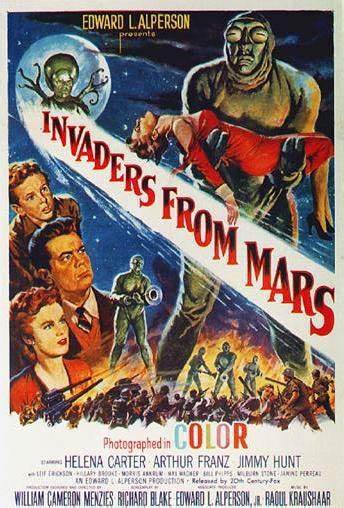PHENOMENALITY: *marvelous*
MYTHICITY: *good*
FRYEAN MYTHOS: *drama*
CAMPBELLIAN FUNCTION: *cosmological, psychological*
Despite my grading INVADERS with high mythicity, this won't be one of the reviews where I examine the plot in excruciating detail. That's largely because, as many before me have noted, that this seminal fifties SF-film doesn't have that much of a plot. From first to last, director and production designer William Cameron Menzies created an alien-invasion film with the semblance of a fever dream. And many critics have chosen to believe that the story of grade-schooler David (Jimmy Hunt) was intended to be no more than a dream, which in my phenomenality system would place it in the domain of the uncanny, like Carroll's ALICE books and the 1939 WIZARD OF OZ.
To quickly sum up what plot INVADERS does have, Young David is the son of George (Leif Erickson), a suburb-dwelling scientist and his wife Mary (Hillary Brooke). One night David, who shares his father's interest in astronomy, hears noises outside his window. Looking out, he sees a flying saucer land some short distance away, in a nearby sand pit. He apprises his father of this incident, and George goes to check things out. George later returns, his friendly demeanor altered to a cold, ruthless persona. Cops sent to investigate George's initial disappearance are seen being swallowed by the sand pit, after which they, like George, become emotionless pawns of the saucer beneath the sand. More and more citizens of the unnamed town become Martian zombies, including David's mother. However, David makes new allies, with a good new "mom" and "dad" to help him-- the maternal psychiatrist Doctor Blake (Helena Carter), and a renowned astronomer, Doctor Kelston (Arthur Franz). With their help, David is able to convey his story to the U.S. army, and the pride of the military invades the underground sanctum of the invaders, apparently consisting of a hyper-evolved Martian brain and about a half-dozen brawny "Mu Tant" flunkies. Just as the military sets a bomb to destroy the underground saucer-complex, Jimmy experiences a vertiginous replay of all the things that happened to him and wakes up from a very long dream. But does he wake to reality, or to a new nightmare?
Before addressing the quixotic ending, I want to stress that I didn't look up any details about the production of INVADERS except to compare its official budget to that of other sci-fi flicks in the early 1950s. So far as I can tell, this decade was the first one to start putting real money behind some prestige projects, as opposed to B-movie budgets. Two of the first critically heralded movies of the decade, THE DAY THE EARTH STOOD STILL and THE THING FROM ANOTHER WORLD, edged close to $2 million budgets, and that figure was the precise amount estimated for the 1953 WAR OF THE WORLDS. WORLDS was the movie that INVADERS sought to beat into theaters with an excursion into full-color extraterrestrials.
But director Menzies had a much more limited budget-- a little higher than the really cheap entries of the period, but still, only roughly $300,000, about fifteen percent of the WORLDS budget. I hypothesize that this might have played into his decision to associate himself with a project whose script took a "maybe it's all a dream" tack. Professionally, Menzies was an art director first and anything else second, and so INVADERS gave him a chance to work out all sorts of visual experiments with extremes of color, forced perspective, and other effects too numerous to mention here. The rationale that all or most of David's "close encounter of the third kind" was just a dream gave Menzies the chance to picture most of the images as being filtered through a child's mind.
However, the denouement doesn't actually validate the "all a dream" solution in that Dorothy Gale manner. During the first part of what seems to be a dream, when David first witnessed the saucer's descent, the craft is accompanied by an eerie humming. But, as a poster on this CHFB thread pointed out, at the film's end David wakes up, assumes all that transpired is a dream, and then sees the saucer in reality again-- but this time, the saucer is accompanied by the sound of an ordinary airplane.
Did someone, be it the screenwriter or Menzies, mean to suggest that in reality, David saw a mundane airplane but imagined that it was a flying saucer? I think that's meant to be a possibility, but not a definite one. If the intent was to say that David was merely projecting, Menzies could have started with the image of a real plane, and then superimposed the image of a saucer-- in which situation the audience would have been certain that David's visual sighting was not veracious. But the audience only sees what David sees, and that allows for a countervailing possibility. If the saucer is real, and the airplane-noise is not, then David has experienced a premonitory dream of extreme complexity-- albeit still filtered through a child's perceptions-- much like that of the central protagonist of the 1945 horror-anthology, DEAD OF NIGHT.
Since I assume Menzies was in charge of all the visuals of INVADERS, I tend to credit him with these competing sensory tropes, where an image tells the viewers one thing, and a sound tells them another. Given that Menzies allows for the possibility that everything in the dream will soon come to pass in reality, I judge INVADERS to be dominantly marvelous.

No comments:
Post a Comment